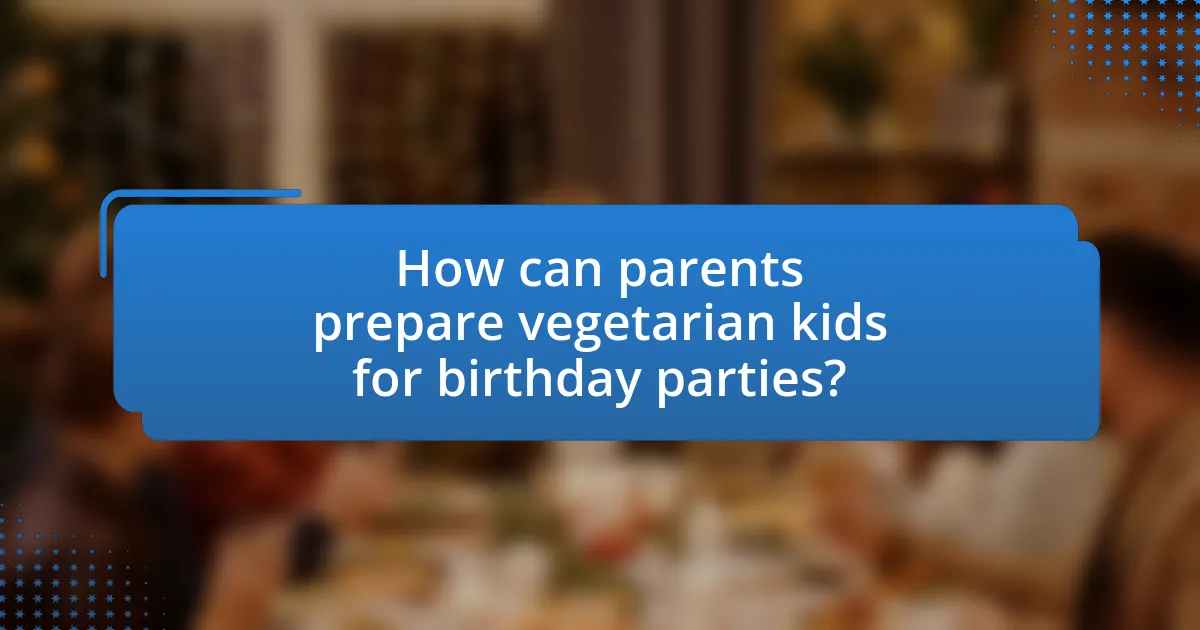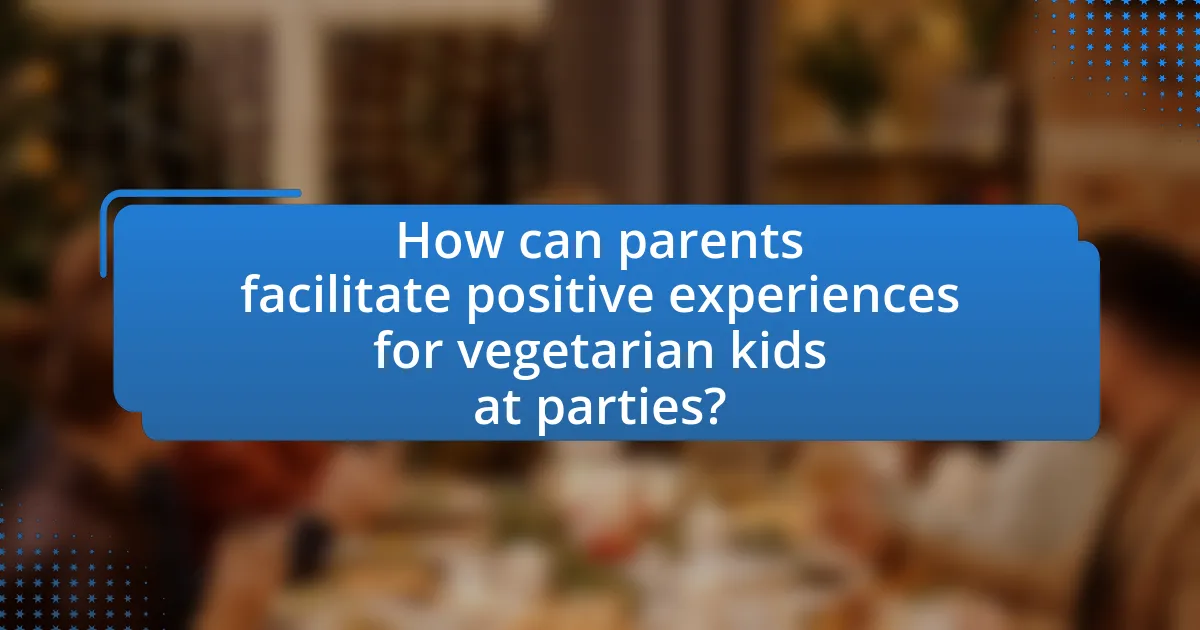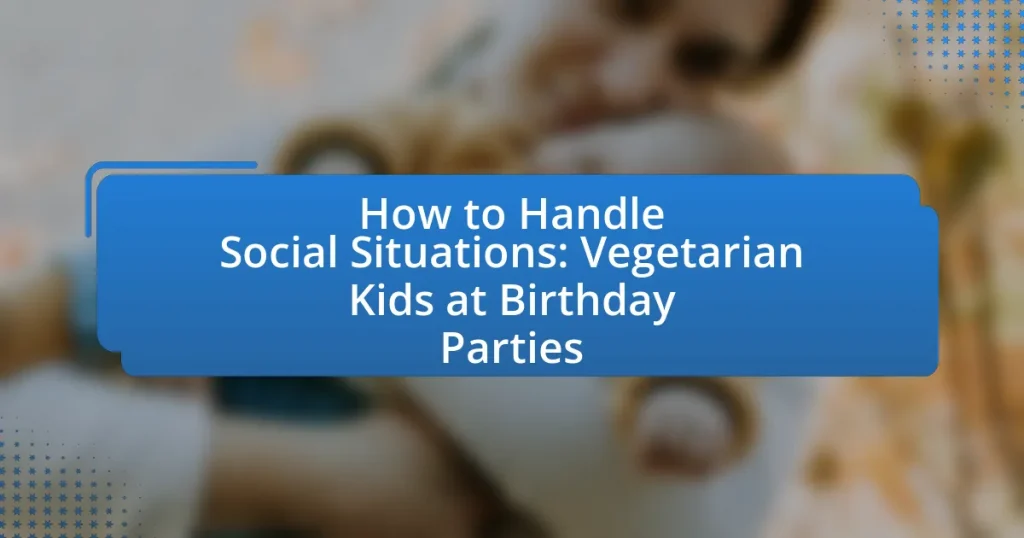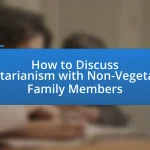The article focuses on how parents can effectively prepare vegetarian children for birthday parties, addressing dietary restrictions and ensuring suitable food options. It emphasizes the importance of communication with party hosts regarding vegetarian-friendly dishes and potential allergies. Additionally, the article provides strategies for parents to explain vegetarianism to peers, cope with social pressures, and suggest appealing vegetarian alternatives to traditional party foods. It also highlights the role of parents in planning inclusive menus and offers creative snack ideas to enhance the party experience for vegetarian kids.

How can parents prepare vegetarian kids for birthday parties?
Parents can prepare vegetarian kids for birthday parties by ensuring they have suitable food options available. This can be achieved by communicating with the party host in advance to discuss vegetarian-friendly dishes, such as vegetable platters, fruit skewers, or cheese and crackers. Additionally, parents can pack a favorite vegetarian snack or meal for their child to enjoy, ensuring they have something to eat if vegetarian options are limited. Research indicates that children who are involved in meal planning are more likely to enjoy their food, making it beneficial for parents to engage their kids in selecting what they would like to bring.
What should parents communicate to hosts about dietary restrictions?
Parents should communicate specific dietary restrictions to hosts to ensure the safety and comfort of their children. This includes detailing any allergies, intolerances, or dietary preferences, such as vegetarianism or veganism. For instance, if a child is allergic to nuts, parents must inform the host to prevent any potential health risks. Clear communication helps hosts plan appropriate meals and snacks, ensuring that all children can participate fully in the celebration without health concerns or dietary discomfort.
How can parents explain vegetarianism to other children?
Parents can explain vegetarianism to other children by clearly stating that it is a lifestyle choice where individuals do not eat meat for various reasons, including health, environmental concerns, or animal welfare. They can provide simple examples, such as explaining that many people choose vegetarianism to promote better health or to protect animals. Research indicates that children can understand basic dietary choices when presented in relatable terms, such as discussing favorite foods that are vegetarian, like fruits, vegetables, and grains. This approach fosters understanding and respect among peers, making it easier for children to accept dietary differences during social situations like birthday parties.
What information should be shared with the birthday party host?
The information that should be shared with the birthday party host includes dietary restrictions, specifically whether the child is vegetarian, and any allergies that may affect food choices. Communicating these details ensures that the host can provide suitable food options that accommodate the child’s dietary needs, promoting inclusivity and safety during the celebration. For instance, according to the American Academy of Pediatrics, clear communication about dietary preferences and restrictions is essential for ensuring that all children can enjoy the party without health risks or discomfort.
How can parents ensure their vegetarian kids have enjoyable options?
Parents can ensure their vegetarian kids have enjoyable options by providing a variety of appealing vegetarian foods at social events. This includes offering colorful vegetable platters, creative pasta salads, and flavorful dips, which can make the meal visually appealing and tasty. Research indicates that children are more likely to enjoy meals that are presented in an engaging way, such as using fun shapes or vibrant colors (Source: “The Role of Food Presentation in Children’s Eating Behavior,” Journal of Nutrition Education and Behavior, 2018). Additionally, involving kids in the meal planning process can help them feel more excited about the options available, ensuring they have a say in what they eat.
What types of vegetarian foods are suitable for birthday parties?
Vegetarian foods suitable for birthday parties include vegetable platters, fruit skewers, cheese and cracker trays, mini sandwiches with hummus or avocado, and pasta salads. These options are popular because they cater to various tastes and dietary restrictions while being easy to prepare and serve. For instance, vegetable platters can include carrots, cucumbers, and bell peppers, which are visually appealing and nutritious. Fruit skewers offer a fun, portable way to enjoy fresh fruit, while cheese and cracker trays provide a savory option that pairs well with beverages. Mini sandwiches can be customized with different spreads and fillings, making them versatile for guests. Pasta salads can be made with a variety of ingredients, such as cherry tomatoes, olives, and herbs, appealing to both children and adults.
How can parents suggest vegetarian alternatives to traditional party foods?
Parents can suggest vegetarian alternatives to traditional party foods by offering options such as vegetable platters, fruit skewers, and cheese quesadillas. These alternatives not only maintain the festive spirit but also cater to dietary preferences. For instance, vegetable platters can include a variety of colorful vegetables with dips, making them visually appealing and nutritious. Additionally, fruit skewers provide a sweet treat that is easy to handle and eat. Cheese quesadillas can be cut into fun shapes, making them attractive to children. By presenting these alternatives, parents can ensure that vegetarian kids feel included and enjoy the party experience without compromising their dietary choices.

What challenges might vegetarian kids face at birthday parties?
Vegetarian kids may face limited food options at birthday parties, as many traditional party foods, such as pizza, hot dogs, and cake, often contain meat or animal-derived ingredients. This can lead to feelings of exclusion or hunger if suitable alternatives are not provided. Additionally, social dynamics may create pressure to conform to the eating habits of peers, making vegetarian children feel uncomfortable or self-conscious about their dietary choices.
How can parents help kids cope with peer pressure regarding food choices?
Parents can help kids cope with peer pressure regarding food choices by fostering open communication and encouraging confidence in their dietary preferences. By discussing the importance of their food choices and providing education about nutrition, parents can empower children to make informed decisions. Research indicates that children who feel supported by their parents are more likely to resist negative peer influences (Gonzalez et al., 2018, Journal of Adolescent Health). Additionally, involving kids in meal planning and preparation can enhance their sense of ownership over their food choices, making them more resilient in social situations.
What strategies can kids use to handle questions about their diet?
Kids can handle questions about their diet by using clear and confident communication. They can explain their dietary choices, such as being vegetarian, by sharing simple reasons like health benefits or ethical beliefs. For instance, they might say, “I choose not to eat meat because I care about animals.” This approach not only provides clarity but also invites understanding from peers. Additionally, kids can practice responses with parents or friends to build confidence, ensuring they feel prepared for various questions. Engaging in conversations about food can also help normalize their dietary choices, making it easier to address inquiries in social settings like birthday parties.
How can parents support their kids in social situations involving food?
Parents can support their kids in social situations involving food by preparing them in advance and encouraging open communication. Preparing kids involves discussing the types of food they may encounter, helping them understand their dietary preferences, and practicing how to politely decline or request alternatives. Encouraging open communication allows children to express their feelings about food choices and seek help from parents when needed. Research indicates that children who feel supported by their parents are more likely to navigate social situations confidently, reducing anxiety and promoting positive interactions.
What are common misconceptions about vegetarian diets at social events?
Common misconceptions about vegetarian diets at social events include the belief that vegetarian options are limited, that vegetarians cannot enjoy social gatherings, and that vegetarian food is less satisfying. Many people assume that social events will only feature meat-based dishes, neglecting the variety of delicious vegetarian options available, such as salads, pasta, and vegetable platters. Additionally, the notion that vegetarians miss out on social experiences is unfounded; many vegetarians actively participate and enjoy events by bringing their own dishes or finding suitable options. Research indicates that vegetarian meals can be equally filling and flavorful, dispelling the myth that they are less satisfying than meat-based meals.
How can parents address misunderstandings about vegetarianism?
Parents can address misunderstandings about vegetarianism by providing clear, factual information about the dietary choice. Educating others about the health benefits of a vegetarian diet, such as lower risks of heart disease and obesity, can help dispel myths. For instance, studies show that vegetarian diets can provide adequate nutrition when well-planned, as supported by the Academy of Nutrition and Dietetics. Additionally, parents can share personal experiences and the reasons behind their family’s dietary choices, fostering understanding and respect. Engaging in open conversations and encouraging questions can further clarify misconceptions and promote acceptance in social settings, such as birthday parties.
What myths should be debunked to promote understanding among peers?
Myths that should be debunked to promote understanding among peers include the belief that vegetarian diets are unhealthy for children and that vegetarian kids are picky eaters. Research indicates that well-planned vegetarian diets can provide all necessary nutrients for children, supporting healthy growth and development (American Dietetic Association, 2009). Additionally, the stereotype of vegetarian kids being picky eaters is often unfounded; many enjoy a variety of foods and flavors, which can enhance their social experiences at events like birthday parties. By addressing these myths, peers can foster a more inclusive environment that respects dietary choices.

How can parents facilitate positive experiences for vegetarian kids at parties?
Parents can facilitate positive experiences for vegetarian kids at parties by ensuring that there are ample vegetarian food options available. Providing a variety of appealing vegetarian dishes, such as vegetable skewers, fruit platters, and pasta salads, helps vegetarian children feel included and satisfied. Research indicates that inclusive food options can enhance social interactions and overall enjoyment at gatherings, as children are more likely to engage with peers when they have suitable food choices. Additionally, parents can communicate with the party host in advance to discuss dietary preferences, ensuring that vegetarian kids are considered in the meal planning.
What role do parents play in planning for vegetarian-friendly parties?
Parents play a crucial role in planning vegetarian-friendly parties by ensuring that the menu accommodates the dietary preferences of vegetarian children. They are responsible for selecting appropriate food options, such as plant-based dishes, and communicating these choices to other parents and guests. Research indicates that 3.3% of children in the U.S. identify as vegetarian, highlighting the importance of inclusive planning to cater to diverse dietary needs. By actively engaging in the planning process, parents can create an enjoyable and inclusive environment for all attendees, fostering a sense of community and respect for different lifestyles.
How can parents collaborate with hosts to create inclusive menus?
Parents can collaborate with hosts to create inclusive menus by openly communicating dietary preferences and restrictions. This collaboration involves parents providing hosts with a list of vegetarian options and any specific allergies or dietary needs their children may have. Research indicates that inclusive menu planning enhances participation and satisfaction among children with dietary restrictions, fostering a more enjoyable social experience. By sharing recipes or suggesting popular vegetarian dishes, parents can help hosts feel more confident in accommodating all guests, ensuring that everyone has suitable food choices at birthday parties.
What are some creative ideas for vegetarian party snacks?
Creative ideas for vegetarian party snacks include stuffed mini peppers, vegetable spring rolls, and caprese skewers. Stuffed mini peppers can be filled with cream cheese, herbs, and spices, providing a flavorful bite. Vegetable spring rolls, made with rice paper and filled with fresh vegetables and herbs, offer a light and refreshing option. Caprese skewers, featuring cherry tomatoes, mozzarella balls, and basil drizzled with balsamic glaze, combine taste and visual appeal. These snacks cater to vegetarian preferences while ensuring variety and enjoyment at birthday parties.
What tips can help vegetarian kids enjoy birthday parties?
To help vegetarian kids enjoy birthday parties, parents should communicate dietary preferences to the host in advance. This ensures that suitable vegetarian options are available, such as veggie platters, fruit skewers, or cheese pizzas. Additionally, involving vegetarian kids in the planning process can empower them to suggest their favorite foods, making them feel included. Research indicates that children who participate in food selection are more likely to enjoy the meal (Journal of Nutrition Education and Behavior, 2015, by Contento et al.). Providing a fun and engaging atmosphere with games and activities unrelated to food can also enhance their overall experience at the party.
How can kids engage with others while respecting their dietary choices?
Kids can engage with others while respecting their dietary choices by communicating openly about their preferences and participating in inclusive activities. For instance, they can suggest games or discussions that do not revolve around food, allowing everyone to join in without focusing on dietary restrictions. Additionally, kids can bring their own snacks that align with their dietary choices, which can encourage sharing and conversation about different foods. Research shows that inclusive environments foster better social interactions, as seen in studies highlighting the importance of acceptance and understanding in peer relationships.
What are some fun activities that don’t revolve around food?
Fun activities that don’t revolve around food include outdoor games, arts and crafts, and interactive group games. Outdoor games such as tag or capture the flag promote physical activity and teamwork. Arts and crafts allow children to express creativity through projects like painting or building models. Interactive group games, such as charades or scavenger hunts, encourage social interaction and problem-solving skills. These activities provide engaging alternatives that foster fun and connection without focusing on food.


